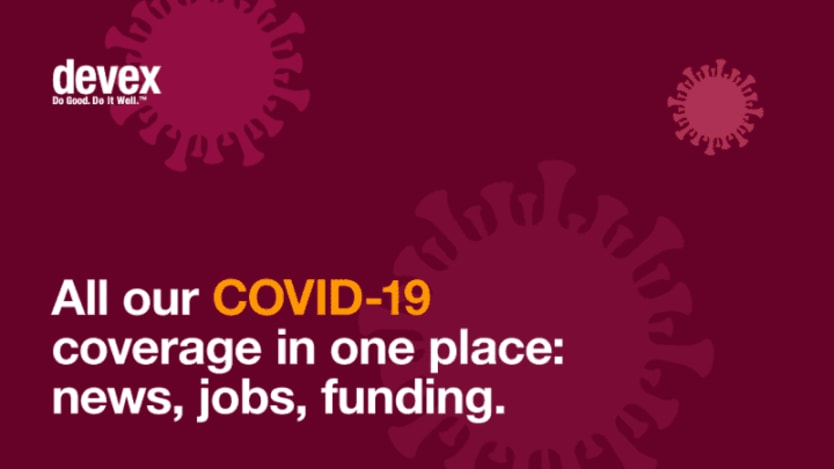
With 84% of the world population identifying with a religious group, faith communities and agencies are essential stakeholders during a pandemic like the one we are facing today, affecting all communities and traditions globally. In such a context, if we are serious about leaving no one behind, we cannot neglect local response and community engagement to reach and empower the most vulnerable.
We know from lessons learned out of the response to the Ebola crisis in West and Central Africa that faith leaders played a crucial role in the local response and were on the front line of multilateral cooperation. As trusted sources of information, they have persuaded and supported communities in embracing the lifesaving advice of health practitioners against perceived stigma, discrimination, and fear. To do so, reports explain, many Christian and Muslim leaders have engaged in education campaigns and gone door to door and village to village to give messages on behavior change.
Putting localization at the center of the humanitarian future
At the 2019 Asia Pacific Humanitarian Leadership Conference, participants discussed the value of embracing localization when responding to the growing number of natural and man-made crises.
Therefore, to be effective in tackling the COVID-19 pandemic, governments and international aid agencies urgently need to further existing efforts to develop their “faith literacy” by prioritizing training staff in the religious and cultural context of the communities in which they work and encouraging the inclusion of faith leaders in program design and delivery. This will allow for straightforward, informed, and comprehensive health interventions — especially in those settings where neither the local government nor international institutions are perceived as present or trustworthy by the local communities.
In fragile contexts where complex political realities and tensions between state and nonstate actors can quickly escalate, this pandemic will most certainly have catastrophic consequences. While government leadership is essential, the response to public health and humanitarian crises needs to adopt a wider approach in strengthening national health systems, building on government, private sector, and civil society capacities, including those of faith-based organizations and leaders.
As trusted authorities in their communities, they are a lasting presence even when the pressing phase of the emergency is believed to be over. This presence ensures continuity and community preparedness for the next crisis. It would be a mistake not to consult them when designing the humanitarian response to COVID-19 and the development of a shared agenda for preparedness and recovery.
Dr. Denis Mukwege — founder of Panzi Hospital in the Democratic Republic of the Congo and 2018 Nobel Peace Prize laureate — has witnessed encouraging reports in Congo of pastors and elders helping to play a key role and of the potential to use church influence to reduce the spread of the coronavirus and support people through the transmission of public health messages and practical assistance to households that need to isolate.
Governments and international aid agencies urgently need to further existing efforts to develop their “faith literacy.”
—From his own experience, he has seen that in many African nations, religion is a key part of stability and a driver for development. In some countries, it could represent the only viable and legitimate authority when people lose trust in politicians.
In the early stages of the Ebola responses, we saw mistakes when the approach taken was purely medical. When Ebola struck, many thought it needed a wholly medical response. But in fact, the social response was vital for reducing transmissions. To combat COVID-19, we again need to teach people how to protect themselves.
We know that beyond the medical response, strategies to contain Ebola and current coronavirus rely on social mobilization and behavioral change through a careful balance of self-isolation, hygiene measures, and safeguarding well-being — from physical and economic to psychological and spiritual. Many of the practices related to good hygiene and safe bereavement and burial that are central to the health response are informed by belief systems and therefore require the engagement of communities and their leaders — both religious and secular — to reinforce or encourage behavioral change.
The United Nations, European Union, and donors have recognized the needs of the most vulnerable groups and hardest-to-reach in this crisis, and UNICEF has led the way with a global, multireligious COVID-19 response.
This recognition has so far not been matched by a strong partnership with local civil society, including faith-based agencies and leaders. The U.N.-led global COVID-19 response allocates 95% of funding to nine U.N. entities, while local and national civil-society organizations struggle to gain access to the decision-making tables. It is myopic to exclude those who, according to the World Health Organization, are a primary source of support, comfort, and guidance and direct health care and social services for the communities they serve.
Pandemics affect everyone, and everyone has a stake in flattening the curve of contagion. This is a critical moment in our response to COVID-19. World Health Organization chief Tedros Adhanom Ghebreyesus has cautioned that “this virus will be with us for a long time.” But there is still time to build and strengthen the resilience of communities worldwide.
We must act swiftly and develop locally led, holistic approaches that are able to connect the global to the local level. Who is better-placed than faith-based organizations and local leaders? They are already there.
Visit our dedicated COVID-19 page for news, job opportunities, and funding insights.









